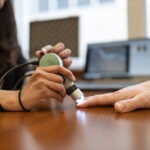About
As technology and society advance, so must health care.
Evolution of the industry must come through innovation – and not just technological innovation, but finding new and better ways to serve patients and the workforce.
At Hamilton Health Sciences, we believe three innovations are needed for health care organizations to keep up with society over the next decade.
1. Health care must redefine its relationship to patients and empower them with tools to be active partners in their own care.
2. Health care must keep patients continuously and meaningfully connected to their care teams from wherever they are.
3. Health care organizations must become learning systems that empower their workforces to continuously develop new insights and put them into practice.
To learn more about collaborative opportunities with Hamilton Health Sciences’ innovation team, contact innovation@hhsc.ca.
Innovation Strategic Pillars
Empowering patients: We aim to develop and deploy solutions that support patients to take an active role in managing their own health conditions.
Continuous connection: We aim to develop and deploy digital solutions to support successful transitions of care from hospital to home.
Empowering practitioners: We aim to develop learning health systems, which integrate data-driven analysis and clinical decision support to enhance professional practice.
Clinical Projects
Hamilton Health Sciences partnered with SterileCare in the fall of 2021 to use their KiteLockTM solution to clean venous catheters for oncology patients. It’s the newest and most advanced product that can help keep venous catheters clean and free of bacteria, which prevents infection. This partnership was developed through the CAN Health Network, a federally-funded organization that helps health-tech companies quickly and easily bring their innovations to the healthcare sector.
The Surgical Transitions program at Hamilton Health Sciences allows surgical patients to recover at home while being remotely monitored by a hospital-to-home virtual care team from the hospital command centre. The program is based on the latest Canadian research led by a team of surgical care researchers at the Population Health Research Institute, a joint institute of HHS and McMaster University, and expanded in the spring of 2021 thanks to provincial funding.
In late 2020 Hamilton Health Sciences partnered with Verto Health to test a new patient notification and queue-management system. The technology is aimed at keeping patients safely distanced, and to monitor and manage appointments. It came at a time early in the pandemic when medical appointments were being missed due concern of entering the hospital. Since hospitals has heightened safety precautions in place, the Verto system was able to provide this information to patients in an email or text message appointment reminder. This partnership was also developed through the CAN Health Network.
CentRE for dAta science and digiTal hEalth – CREATE
CREATE was founded in 2019 to support research and innovation at Hamilton Health Sciences. Our multidisciplinary team is made up of specialists in health systems, data engineering, data science, software engineering and interoperability. Our mission is to partner with scientists and innovators to invent the future of health care. Visit the CREATE website for more information.
The following are some CREATE projects:
Reducing unnecessary angiograms: Angiogram is a procedure used to diagnose and treat certain cardiovascular conditions. As a diagnostic procedure, it is expensive and involves a small but real risk for patients. However, up to half of the angiograms performed could be avoided by instead using non-invasive testing that is cheaper and less risky. Therefore, CREATE partnered with the HHS Heart Investigation Unit to train an AI model to predict which patients don’t need an angiogram. It’s outperforming any previous models and is estimated to help HHS avoid 250 unnecessary angiograms a year.
Empowering patients recovering from chronic concussion: A concussion is a traumatic brain injury that affects your brain function. While most people recover from a concussion fairly quickly, some patients develop devastating chronic symptoms that can last years. Recovery from chronic concussion relies on patients taking an active role. However, many patients struggle to adhere to their care plans, which can set back their recovery. In partnership with HHS’s Integrated Adult Concussion Clinic, CREATE developed a mobile application, MyHeadHealth, to empower patients to take control of their recovery. It provides patients with a customized care plan from their physician, educational video materials, and daily activity and symptom tracking.
Improving doctors/patient experience: Since primary care providers spend a lot of time in electronic clinical documentation software, Mutuo Health Systems is developing a new product called Autoscribe. With the help of CREATE, Autoscribe will use AI to analyze a conversation between doctor and patient and automatically populate key information into the Electronic Medical Record (EMR). This is more than a simple transcription, just like a trained medical scribe, the AI product pulls out the core clinical elements and inserts them directly into the appropriate part of the EMR. This is estimated to reduce physician screen time by 50% allowing them to spend more time with patients.
Innovation Report
While innovation has long been a pillar of our strategic plan, increasingly strained resources are driving the need for health organizations to find ways to work smarter and more effectively. See the work we have underway below in our 2023 Innovation Report.

